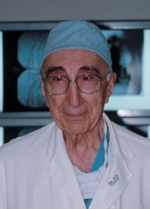Dr. Michael E. DeBakey

For his contributions to the armed forces and his pioneering work in the field of open-heart surgery, the Legion gave the Distinguished Service Medal to DeBakey, who developed the Mobile Army Surgical Hospital, or MASH, unit common in the Korean War. Presenting the award, National Commander Miles S. Epling said DeBakey "has the enviable reputation as a medical statesman, serving as adviser to almost every president in the past 50 years. ... More than 1,200 published medical articles, chapters and books reflect his lifelong commitment to research and public education in the prevention and treatment of heart disease."
DeBakey understood that the nation's concern for the health of its fighting men and women shouldn't cease once they return home. "On Sept. 2, 1945, World War II ended rather abruptly after our bombing of Japan," he noted. "Thousands of casualties in the European and Pacific theaters began returning home for reparative surgery and rehabilitation. Fortunately, we had the foresight to establish specialized centers in vascular surgery, orthopedics, plastic surgery and neurosurgery, all well-manned with civilians."
Decades later, DeBakey warned that the nation must not lower its defenses in the wake of the Cold War, criticizing moves to cut the defense budget. "After too brief an interval of this euphoria ... the need for the military to remain alert and ready for any national threat or disaster came shockingly home to us with the outbreak of the current Mideast crisis," he said.
Born Michel Dabaghi to Lebanese immigrants, DeBakey spent decades working on cardiovascular advances, including the artificial heart.
Linked for nearly 50 years to the surgery department that bears his name at Baylor College of Medicine, DeBakey earned his medical degree at Tulane University. As a 23-year-old student, he invented the roller pump, which provided an ongoing flow of blood during surgery. The device became a critical component of the heart-lung machine and in open-heart surgery. DeBakey achieved another milestone in 1961, with the first implantation of a partial artificial heart.
In 2006, at 97, DeBakey underwent surgery for an aortic dissection - surgery he had pioneered years earlier. Following a lengthy recuperation, he returned to good health and practiced medicine until his death two years later.
Just months before, DeBakey received the Congressional Gold Medal from President George W. Bush, Speaker of the House Nancy Pelosi and Senate Majority Leader Harry Reid.
For more on DeBakey, click here (http://www.debakeydepartmentofsurgery.org/home/content.cfm?content_id=287).
